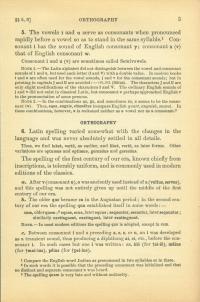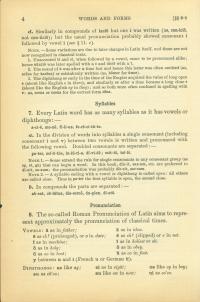6. Latin spelling varied somewhat with the changes in the language and was never absolutely settled in all details.
Thus, we find lubet, vortō, as earlier, and libet, vertō, as later forms. Other variations are optumus and optimus, gerundus and gerendus.
The spelling of the first century A.D. (known chiefly from inscriptions) is tolerably uniform, and is commonly used in modern editions of the classics.
a. After v (consonantal u), o was anciently used instead of u (voltus, servos). This spelling was not entirely given up until the middle of the first century A.D.
b. The older quo became cu in the Augustan period; in the second century A.D. the spelling quu- established itself in some words:
cum (older quom1)
equos, ecus (later equus)
sequontur, secuntur (later sequuntur)
Similarly
exstinguont, exstingunt (later exstinguunt)
Note— In most modern editions the spelling quu- is adopted, except in cum.
c. Between consonantal i and a preceding a, e, o, or u, an i was developed as a transient sound, thus producing a diphthong ai, ei, etc., before the consonantal i. In such cases only one i was written: âiō (for †ai-iō), mâius (for †mai-ius), pêius (for †pei-ius).
d. Similarly in compounds of iaciō only one i was written (as, con-iciō, not con-iici); but the usual pronunciation probably showed consonantal i followed by vowel i (see § 11.e).
Note— Some variations are due to later changes in Latin itself, and these are not now recognized in classical texts.
- Unaccented ti and ci, when followed by a vowel, came to be pronounced alike; hence nūntiō was later spelled with a c and diciō with a t.
- The sound of h was after a time lost and hence this letter was often omitted (as, arēna for harēna) or mistakenly written (as, hūmor for ūmor).
- The diphthong ae early in the time of the Empire acquired the value of long open e (about like English e in there), and similarly oe after a time became a long close e (about like the English ey in they); and so both were often confused in spelling with e: coena or caena for the correct form cēna.


